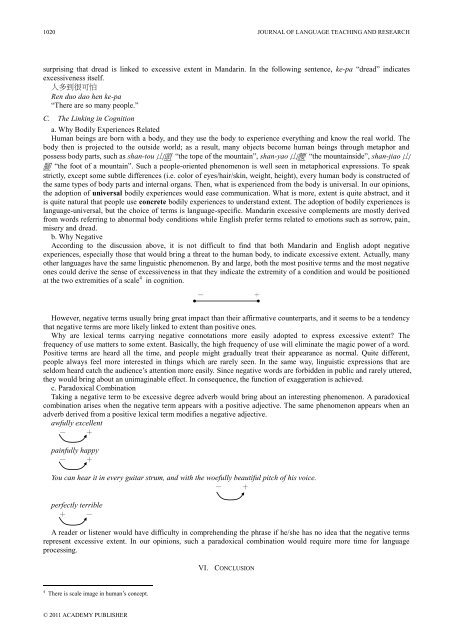Journal of Language Teaching and Research Contents - Academy ...
Journal of Language Teaching and Research Contents - Academy ...
Journal of Language Teaching and Research Contents - Academy ...
You also want an ePaper? Increase the reach of your titles
YUMPU automatically turns print PDFs into web optimized ePapers that Google loves.
1020<br />
© 2011 ACADEMY PUBLISHER<br />
JOURNAL OF LANGUAGE TEACHING AND RESEARCH<br />
surprising that dread is linked to excessive extent in M<strong>and</strong>arin. In the following sentence, ke-pa ―dread‖ indicates<br />
excessiveness itself.<br />
人多到很可怕<br />
Ren duo dao hen ke-pa<br />
―There are so many people.‖<br />
C. The Linking in Cognition<br />
a. Why Bodily Experiences Related<br />
Human beings are born with a body, <strong>and</strong> they use the body to experience everything <strong>and</strong> know the real world. The<br />
body then is projected to the outside world; as a result, many objects become human beings through metaphor <strong>and</strong><br />
possess body parts, such as shan-tou 山頭 ―the tope <strong>of</strong> the mountain‖, shan-yao 山腰 ―the mountainside‖, shan-jiao 山<br />
腳 ―the foot <strong>of</strong> a mountain‖. Such a people-oriented phenomenon is well seen in metaphorical expressions. To speak<br />
strictly, except some subtle differences (i.e. color <strong>of</strong> eyes/hair/skin, weight, height), every human body is constructed <strong>of</strong><br />
the same types <strong>of</strong> body parts <strong>and</strong> internal organs. Then, what is experienced from the body is universal. In our opinions,<br />
the adoption <strong>of</strong> universal bodily experiences would ease communication. What is more, extent is quite abstract, <strong>and</strong> it<br />
is quite natural that people use concrete bodily experiences to underst<strong>and</strong> extent. The adoption <strong>of</strong> bodily experiences is<br />
language-universal, but the choice <strong>of</strong> terms is language-specific. M<strong>and</strong>arin excessive complements are mostly derived<br />
from words referring to abnormal body conditions while English prefer terms related to emotions such as sorrow, pain,<br />
misery <strong>and</strong> dread.<br />
b. Why Negative<br />
According to the discussion above, it is not difficult to find that both M<strong>and</strong>arin <strong>and</strong> English adopt negative<br />
experiences, especially those that would bring a threat to the human body, to indicate excessive extent. Actually, many<br />
other languages have the same linguistic phenomenon. By <strong>and</strong> large, both the most positive terms <strong>and</strong> the most negative<br />
ones could derive the sense <strong>of</strong> excessiveness in that they indicate the extremity <strong>of</strong> a condition <strong>and</strong> would be positioned<br />
at the two extremities <strong>of</strong> a scale 4 in cognition.<br />
However, negative terms usually bring great impact than their affirmative counterparts, <strong>and</strong> it seems to be a tendency<br />
that negative terms are more likely linked to extent than positive ones.<br />
Why are lexical terms carrying negative connotations more easily adopted to express excessive extent? The<br />
frequency <strong>of</strong> use matters to some extent. Basically, the high frequency <strong>of</strong> use will eliminate the magic power <strong>of</strong> a word.<br />
Positive terms are heard all the time, <strong>and</strong> people might gradually treat their appearance as normal. Quite different,<br />
people always feel more interested in things which are rarely seen. In the same way, linguistic expressions that are<br />
seldom heard catch the audience’s attention more easily. Since negative words are forbidden in public <strong>and</strong> rarely uttered,<br />
they would bring about an unimaginable effect. In consequence, the function <strong>of</strong> exaggeration is achieved.<br />
c. Paradoxical Combination<br />
Taking a negative term to be excessive degree adverb would bring about an interesting phenomenon. A paradoxical<br />
combination arises when the negative term appears with a positive adjective. The same phenomenon appears when an<br />
adverb derived from a positive lexical term modifies a negative adjective.<br />
awfully excellent<br />
- +<br />
painfully happy<br />
- +<br />
You can hear it in every guitar strum, <strong>and</strong> with the woefully beautiful pitch <strong>of</strong> his voice.<br />
- +<br />
perfectly terrible<br />
+ -<br />
A reader or listener would have difficulty in comprehending the phrase if he/she has no idea that the negative terms<br />
represent excessive extent. In our opinions, such a paradoxical combination would require more time for language<br />
processing.<br />
4 There is scale image in human’s concept.<br />
VI. CONCLUSION

















